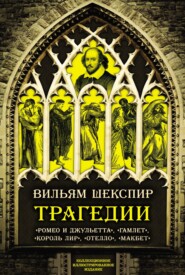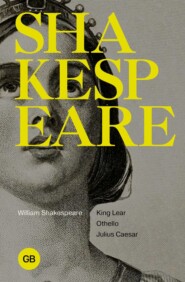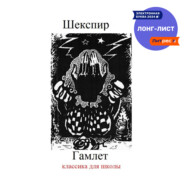По всем вопросам обращайтесь на: info@litportal.ru
(©) 2003-2024.
✖
Measure for Measure
Настройки чтения
Размер шрифта
Высота строк
Поля
Measure for Measure
Уильям Шекспир
William Shakespeare
Measure for Measure
DRAMATIS PERSONAE
VINCENTIO, the Duke
ANGELO, the Deputy
ESCALUS, an ancient Lord
CLAUDIO, a young gentleman
LUCIO, a fantastic
Two other like Gentlemen
VARRIUS, a gentleman, servant to the Duke
PROVOST
THOMAS, friar
PETER, friar
A JUSTICE
ELBOW, a simple constable
FROTH, a foolish gentleman
POMPEY, a clown and servant to Mistress Overdone
ABHORSON, an executioner
BARNARDINE, a dissolute prisoner
ISABELLA, sister to Claudio
MARIANA, betrothed to Angelo
JULIET, beloved of Claudio
FRANCISCA, a nun
MISTRESS OVERDONE, a bawd Lords, Officers, Citizens, Boy, and Attendants
SCENE: Vienna
ACT I. SCENE I. The DUKE'S palace
Enter DUKE, ESCALUS, LORDS, and ATTENDANTS
DUKE. Escalus!
ESCALUS. My lord.
DUKE. Of government the properties to unfold
Would seem in me t' affect speech and discourse,
Since I am put to know that your own science
Exceeds, in that, the lists of all advice
My strength can give you; then no more remains
But that to your sufficiency- as your worth is able-
And let them work. The nature of our people,
Our city's institutions, and the terms
For common justice, y'are as pregnant in
As art and practice hath enriched any
That we remember. There is our commission,
From which we would not have you warp. Call hither,
I say, bid come before us, Angelo. Exit an ATTENDANT
What figure of us think you he will bear?
For you must know we have with special soul
Elected him our absence to supply;
Lent him our terror, dress'd him with our love,
And given his deputation all the organs
Of our own power. What think you of it?
ESCALUS. If any in Vienna be of worth
To undergo such ample grace and honour,
It is Lord Angelo.
Enter ANGELO
DUKE. Look where he comes.
ANGELO. Always obedient to your Grace's will,
I come to know your pleasure.
DUKE. Angelo,
There is a kind of character in thy life
That to th' observer doth thy history
Fully unfold. Thyself and thy belongings
Are not thine own so proper as to waste
Thyself upon thy virtues, they on thee.
Heaven doth with us as we with torches do,
Not light them for themselves; for if our virtues
Did not go forth of us, 'twere all alike
As if we had them not. Spirits are not finely touch'd
But to fine issues; nor Nature never lends
The smallest scruple of her excellence
But, like a thrifty goddess, she determines
Уильям Шекспир
William Shakespeare
Measure for Measure
DRAMATIS PERSONAE
VINCENTIO, the Duke
ANGELO, the Deputy
ESCALUS, an ancient Lord
CLAUDIO, a young gentleman
LUCIO, a fantastic
Two other like Gentlemen
VARRIUS, a gentleman, servant to the Duke
PROVOST
THOMAS, friar
PETER, friar
A JUSTICE
ELBOW, a simple constable
FROTH, a foolish gentleman
POMPEY, a clown and servant to Mistress Overdone
ABHORSON, an executioner
BARNARDINE, a dissolute prisoner
ISABELLA, sister to Claudio
MARIANA, betrothed to Angelo
JULIET, beloved of Claudio
FRANCISCA, a nun
MISTRESS OVERDONE, a bawd Lords, Officers, Citizens, Boy, and Attendants
SCENE: Vienna
ACT I. SCENE I. The DUKE'S palace
Enter DUKE, ESCALUS, LORDS, and ATTENDANTS
DUKE. Escalus!
ESCALUS. My lord.
DUKE. Of government the properties to unfold
Would seem in me t' affect speech and discourse,
Since I am put to know that your own science
Exceeds, in that, the lists of all advice
My strength can give you; then no more remains
But that to your sufficiency- as your worth is able-
And let them work. The nature of our people,
Our city's institutions, and the terms
For common justice, y'are as pregnant in
As art and practice hath enriched any
That we remember. There is our commission,
From which we would not have you warp. Call hither,
I say, bid come before us, Angelo. Exit an ATTENDANT
What figure of us think you he will bear?
For you must know we have with special soul
Elected him our absence to supply;
Lent him our terror, dress'd him with our love,
And given his deputation all the organs
Of our own power. What think you of it?
ESCALUS. If any in Vienna be of worth
To undergo such ample grace and honour,
It is Lord Angelo.
Enter ANGELO
DUKE. Look where he comes.
ANGELO. Always obedient to your Grace's will,
I come to know your pleasure.
DUKE. Angelo,
There is a kind of character in thy life
That to th' observer doth thy history
Fully unfold. Thyself and thy belongings
Are not thine own so proper as to waste
Thyself upon thy virtues, they on thee.
Heaven doth with us as we with torches do,
Not light them for themselves; for if our virtues
Did not go forth of us, 'twere all alike
As if we had them not. Spirits are not finely touch'd
But to fine issues; nor Nature never lends
The smallest scruple of her excellence
But, like a thrifty goddess, she determines

















